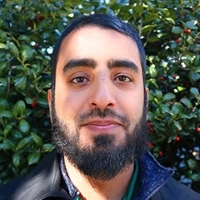Meet Muhammad Rayhaan, a 2019-2020 Disaster Feedback Fellow who is responding immediately after disaster strikes in communities from South Africa to Somalia—and staying for the long haul.

A: My organization, Gift of the Givers Foundation, is based in South Africa. Primarily, we are a disaster relief and disaster management agency, which entails a lot of response in the acute phase of a disaster. We send medical specialists, medical supplies, food, and blankets. We manage the logistics of real rehabilitation in the disaster-affected areas. Beyond disaster response, we focus on hunger alleviation, water provision, health care, education, and human development in areas where we are permanently based. Right now, we have bases in South Africa, Zimbabwe, Malawi, Somalia, Yemen, and Serbia.
A: We were introduced to GlobalGiving in 2017. At that time, we were approached by a company that wanted to give us a donation, but their office was in the US. We had to go to GlobalGiving and be vetted to accept the donation. That led to our South African organization being seen as legitimate in the US. Now, if someone wants to donate to us, they actually have evidence that we are a vetted organization that does good work.
The other thing we really like about GlobalGiving is the proactive nature. Normally when there’s a disaster in South Africa or at any of our other bases, we go to organizations to let them know what is happening and have to ask for their support. But with GlobalGiving, they reach out to us and say, “We hear there’s a problem in Johannesburg. Are you responding, and can we send you a grant?” It’s a very different approach. It’s actually quite fantastic to work that way.
A: There are a few things we need to look at in international response, especially when it comes to disasters. First, it’s all very bureaucratic. I’m not saying we should throw all the processes out the window. But when a disaster happens, people need help now. They can’t wait for a donor conference that’s going to happen in a month’s time. They can’t wait for those decisions to be made and approved. It needs to be a much faster response with funds released immediately so the community can benefit as soon as possible.
When a disaster happens, people need help now. They can’t wait for a donor conference that’s going to happen in a month’s time. They can’t wait for those decisions to be made and approved.
There are a lot of disasters happening these days, but the focus just shifts from one to the next. What happens is we provide the short-term response, and as we get stuck in the development side of it, people’s focus has shifted already.
To truly rehabilitate the disaster-affected place, you need sustained awareness and response. There are a lot of international charities that are going in and sending their teams from overseas, and they get fatigued. They are not used to the environment and the language, and it causes issues. The effectiveness of the response isn’t seen immediately, and that creates frustration. So you need to build local support. You can find local people that you eventually employ directly, or you can work with an organization. It’s about trust, but it’s not blind trust—you must verify the work that you’re doing and build it up slowly. You see how an organization responded in the acute phase of a disaster first, and you get feedback from them. If you go there physically, see whether they did what they said they would. And as that relationship progresses, you build a local partnership to support your work.
Learn more about how GlobalGiving’s Disaster Feedback Fellows are sharing best practices to bolster community-led relief efforts.
Featured Photo by GlobalGivingFind exactly what you're looking for in our Learn Library by searching for specific words or phrases related to the content you need.